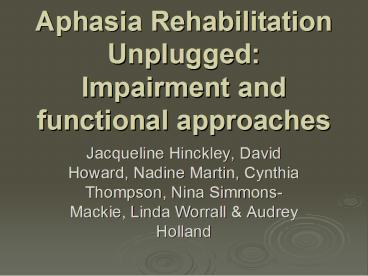Aphasia Rehabilitation Unplugged: Impairment and functional approaches - PowerPoint PPT Presentation
1 / 17
Title:
Aphasia Rehabilitation Unplugged: Impairment and functional approaches
Description:
This presentation grew out of concerns raised by Dr. Anna Basso: ... These talks are dedicated to Anna Basso, whose retirement is being celebrated ... – PowerPoint PPT presentation
Number of Views:477
Avg rating:3.0/5.0
Title: Aphasia Rehabilitation Unplugged: Impairment and functional approaches
1
Aphasia Rehabilitation Unplugged Impairment and
functional approaches
- Jacqueline Hinckley, David Howard, Nadine Martin,
Cynthia Thompson, Nina Simmons-Mackie, Linda
Worrall Audrey Holland
2
Background
- This presentation grew out of concerns raised by
Dr. Anna Basso - Essentially, is there a unifying theory that
underlies treatment for aphasia? - If so, what is that theory?
- If not, why not?
3
The Lerici meetings
- Dr. Basso hosted two meetings at her home in
Lerici, Italy - Goal of the meetings
- To resolve the issue of a theory of aphasia
treatment
4
Dedication
- These talks are dedicated to Anna Basso, whose
retirement is being celebrated this month in
Bologna, Italy
5
First meeting participants
- Anna Basso
- Argye Hillis
- Jacqueline Hinckley
- Nancy Helm-Estabrooks
- David Howard
- Walter Huber
- Linda Garcia
- Linda Worrall
- Alfonso Caramazza
- Margaret Forbes
- Audrey Holland
6
Second meeting participants
- Anna Basso
- Argye Hillis
- Nadine Martin
- Steve Nadeau
- David Howard
- Walter Huber
- Linda Garcia
- Linda Worrall
- Cynthia Thompson
- Nina Simmons-Mackie
- Audrey Holland
7
Meeting one vs Meeting two
- Group recognized vast differences in approaches
- Approaches seemed to have two themes
- Working directly with impairments
- Working with the consequences of these
impairments - Agreed to disagree
- If at first you dont succeed..
- Goal
- To seek common ground
- Still no theory of therapy, but.
- We learned much from each other
8
The outcome..
- Recognized that these important participants
respect each others opinions - Agreed that none of us knows the answers to
questions such as - What is the BEST therapy?
- Where does it happen?
- How can insure that my family member receives it?
9
And finally
- A growing recognition that indeed, there probably
is NO ONE Theory of Therapy. - INSTEAD, there are (possibly ) MANY such
theories. - In my view, competing, viable, data-producing,
mini-theories result in - A vibrant profession!
10
Growing to the point of asking questions such as
- Are some approaches more useful at some points in
the recovery spectrum than at other points? - Are some approaches more appropriate for some
individuals than for others? - Are some approaches more appropriate for some
problems in aphasia than for others? - And many more
11
The Lerici groups have been productive.
- We have individually pursued these topics in our
own work - We have collaborated and continue to talk
- We have conducted a similar session, with
somewhat different speakers and topics at the
World Federation of Neurology, Cognitive
Language Disorders Section in Buenos Aires,
Argentina - We have recently published a book
- Aphasia Rehabilitation The Impairment Its
Consequences (N. Martin, C. Thompson L.
Worrall, editors)
12
Our very useful exercise
- Describe individuals with varying aphasic
symptomatology - Have two clinicians discuss how they would treat
each individual - One clinician committed more strongly to
impairment approaches - The other committed more strongly to approaches
aimed at the consequences of the aphasia on life
activities and participation in society - Look for resulting convergences and divergences
13
Todays presentation will
- Illustrate that process by describing three
individuals with aphasia - A person with anomic aphasia
- A person with nonfluent aphasia
- A person with global aphasia
- Discuss treatment plans for each of them that
reflects - An impairment based approach
- A consequence based approach
14
This symposium will
- Hopefully, delineate common ground for the
treatment of aphasia - Clarify treatment approaches
- Heal the rift that sometimes separates clinicians
who encamp at one or the other end of the
impairment-consequences spectrum.
15
Order of presentation
- Anomic aphasia
- Impairment -based approach--Nadine Martin
- Consequences approach--Jacqueline Hinckley
- Nonfluent aphasia
- Impairment-based approach--Cynthia Thompson
- Consequences approach--Linda Worrall
- Global aphasia
- Impairment based approach--David Howard
- Consequences approach--Nina Simmons-Mackie
16
- Each presentation will end with a discussion of
ways in which the approaches converge and
diverge - Then, at the VERY END, we will have a general
discussion among panelists, and time for your
questions.
17
Before I relinquish the podium to my colleagues
- Probably all well-done therapy makes a
difference - Should be grounded in a defensible theory,
nonetheless - We need to think together about our goals
- Speech or communicating
- Talking vs getting a message across
- Living successfully with aphasia,































